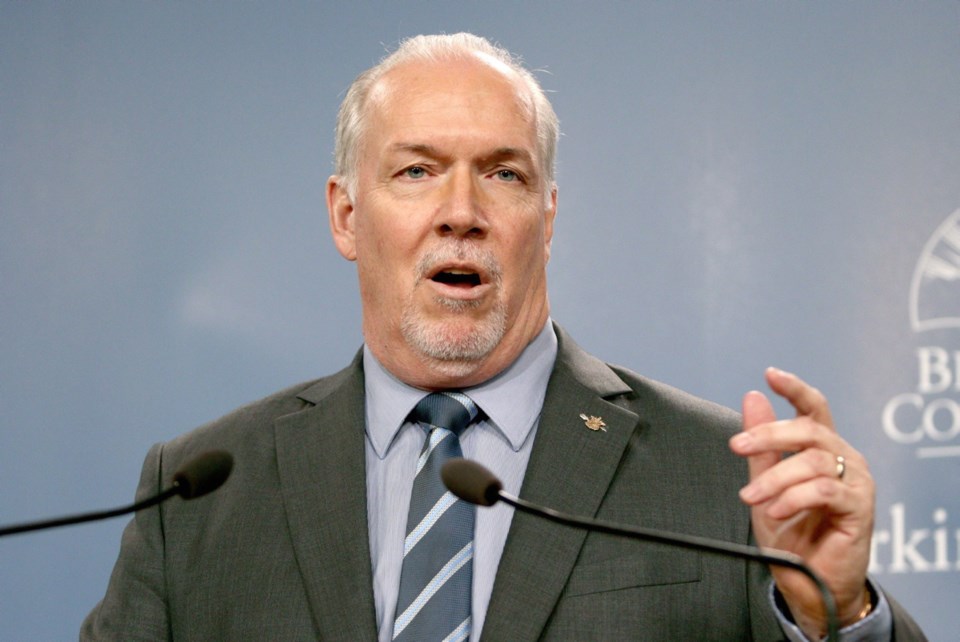The reason Premier John Horgan ducked all public comment about the legislature blockade was because he was too steamed to stand in front of a microphone.
He didnât say it in so many words, but that was the impression left Wednesday after a lengthy news conference in the aftermath of the the seat of government.
He had cancelled a scheduled media appearance and instead issued a news release late in that very tense day after hundreds of protesters jostled and blocked workers trying to enter the legislature.
âI chose not to talk directly to you yesterday because of my personal feelings at the time,â he told reporters during an extended after-action report.
It was a lot more restrained than if it had been conducted in the heat of the day-long shoving match. Because they were âstrongâ feelings, held by many, he said.
There was one brief glimpse of what might have been. Asked about the , who attended and supported the protest and at one point criticized his own police departmentâs approach to it, Horgan said: âMy thoughts on that individual are not printable.â
But after sleeping on it for a night, Horgan decided to try to walk the tightrope between supporting the fundamental right to protest and recognizing the rule of law.
Itâs a tough balancing act and isnât going to get any easier, as more protest blockades appear to be in the works, as early as this Friday. Theyâre going to push him steadily toward emphasizing the need to recognize rule of law, if Wednesdayâs appearance was any indication.
Not that he has much choice.
The blockade was unacceptable to him and the vast majority of British Columbians, he said. Peaceful demonstrations are a fundamental right, âbut to have a group of people say to others: âYou are illegitimate, you are not allowed in here, you are somehow a sellout to the values of Canadiansâ is just plain wrong.â
He stressed how unprecedented the attempt to shut down the legislature was, compared to the protests he routinely used to attend in the past.
âGame-changer,â was the phrase he settled on to describe it.
Horgan said he is not responsible for security or law enforcement but was âsincerely apologeticâ to the legislature staff who had to endure the blockade.
âThese are extraordinary times, these are extraordinary events.â
Horgan also dwelled on the Indigenous rights aspect of the pipeline protest, where itâs linked to some hereditary Wetâsuwetâen chiefsâ opposition to the line, despite widespread support from elected Indigenous leaders.
He said: âI donât believe for a minute, knowing Indigenous peoples broadly speaking as I do, that what they viewed yesterday in their name was how they want to go forward.â
Coming just a few months after the legislature unanimously adopted the UN declaration on Indigenous rights as the new template for all future dealings with First Nations, the demonstrations raise fresh new questions about how itâs all going to work.
In the premierâs view, âthe only way forward is through hard work and commitment to each other.â Horgan also appeared sensitive to any criticism that he didnât take any obvious action to put an end to the blockade. âI donât want to live in a society where politicians direct police to take action against other citizens without appropriate reason for doing so. Thatâs why we have courts. Thatâs why injunctions are sought.â
He was outlining due process in the abstract, but it may become a reality.
Just So You Know: The NDP is wracked with conflicting emotions on the protests, given their previous warm relationships with some of the anti-pipeline factions. The two-member Green caucus â bullied like everyone else on the way in Tuesday â was profoundly troubled by the showdown, too. But theyâre less conflicted, because they opposed LNG from the start and still do.
Green MLAs Adam Olsen and Sonia Fursteneau â and newly independent Andrew Weaver â will be watching the governmentâs response closely if the attempted shutdowns continue. Their support is still crucial to the government.
Right to protest versus rule of law isnât the only tightrope Horgan is walking.



